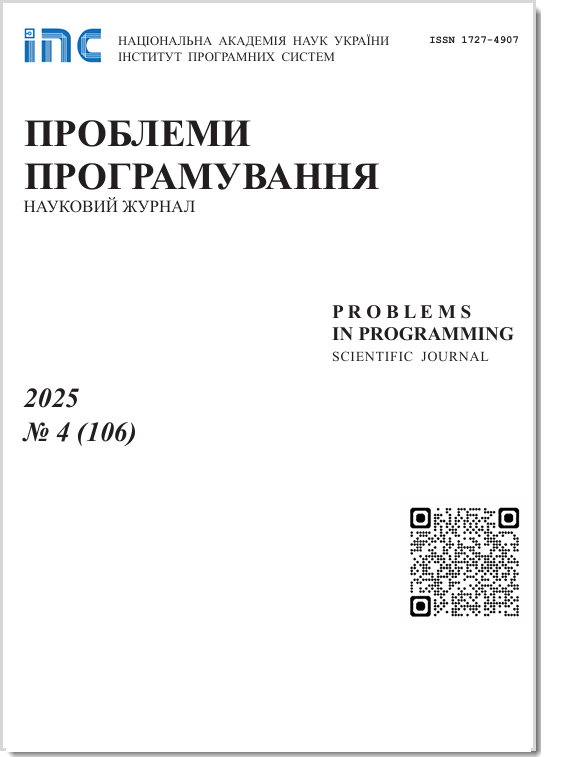Semantic properties of five-valued logics
Abstract
A new class of program-oriented logical formalisms – propositional five-valued logics and five-valued logics of quasiary predicates is proposed and studied in the article. The quasiarity of predicates means that their arity is not fixed. A special feature of such five-valued logics is the use of special truth values, indicating errors or uncertainties in various systems, in particular, software systems. The article gives an ontological justification of five-valued logics and examines their examples. For the propositional level, an algebra of truth values is constructed and its semantic properties are studied. For the predicate level, the five-valued logic of quasiary predicates is constructed, its semantic properties are studied, the relation of equivalence of formulas and the relation of logical consequence are introduced, the principle of duality is proved and various normal forms are considered. Further research is focused on constructing algorithms for checking satisfiability and refutability of formulas and constructing various types of calculi for the introduced logics.
Problems in programming 2018; 1: 22-35
Keywords
Full Text:
PDF (Русский)References
Hähnle R. (2006). Many-Valued Logic, Par-tiality, and Abstraction in Formal Specifica-tion Languages. In Logic Journal of the IGPL. N.13 (4). P. 415–433.
Jones C. (2006) Reasoning about partial func-tions in the formal development of programs. In Electronic Notes in Theoretical Computer Science, AVoCS'05, Elsevier. Vol. 145. P. 3–25. [online]. CrossRef
Gries D. and Schneider F. (1995). Avoiding the undefined by underspecification. In Springer Berlin Heidelberg. P. 366–373. [online]. CrossRef
Nikitchenko N. (1998). A composition-nominative approach to program semantics. – Technical report IT-TR: 1998-020. Technical University of Denmark. 103 p.
Nikitchenko M. (2009). Composition-nominative aspects of address programming. In Cybernetics and Systems Analysis, 45:864. [online]. CrossRef
Nikitchenko M. and Shkilniak S. (2015). Semantic Properties of Logics of Quasiary Predicates. In Workshop on Foundations of Informatics: Proceedings FOI-2015. Chisinau, Moldova. P. 180–197.
Nikitchenko M. and Shkilniak S. (2017). Algebras and logics of partial quasiary predicates. In Algebra and Discrete Mathematics. Vol. 23, N 2. P. 263–278.
Karpenko A. (2010). The Development of Many-Valued Logics. M.: LKI (in rus).
Jordan Z. (1946) The development of mathe-matical logic and logical positivism in Poland between the two wars. Oxford. P. 346–397.
Shramko J. (2009). Truth and Falsity: What Are Truth Values and Why They Are Needed. In Logos. 2(70). P. 96–121 (in rus).
Avron A. and Zamansky A. (2011). Non-deterministic semantics for logical systems. In Handbook of Philosophical Logic, D.M. Gabbay, F. Guenthner (eds.), 2nd ed., vol. 16, Springer Netherlands. P. 227–304. CrossRef
Kobzev A. (2006). The Logic and Dialectics in China. In The Spiritual Culture of China. Vol.1 (in rus).
Plonka J. (1967). On distributive quasi-lattices. In Fundamenta Mathemacae, 60. P. 191–200.
Kryvolap A. and Nikitchenko M. and Schreiner W. (2013). Extending Floyd-Hoare logic for partial pre- and postconditions. In ICTERI 2013, CCIS, Springer, Heidelberg. Р. 355–378. CrossRef
Nikitchenko M. and Tymofieiev V. Satisfia-bility in composition nominative logics. In Central European Journal of Computer Sci-ence. Vol. 2, N 3. P. 194–213.
Nikitchenko M., Shkilniak O. and Shkilni-ak S. (2018). Algebras of general non-deterministic predicates. In Problems in programming. N 1. – P. 3–19. CrossRef
DOI: https://doi.org/10.15407/pp2018.01.022
Refbacks
- There are currently no refbacks.









